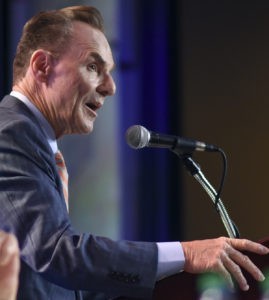Nearly four months after messengers to the Southern Baptist Convention annual meeting overwhelmingly approved appointment of a Sexual Abuse Task Force, the work can begin, although the panel has lost fully one-third of its allocated time before a report is due next June.
The delay finally got cleared Oct. 5 when the SBC Executive Committee reversed course and, against the advice of its staff leadership and legal counsel, bowed to the desires of convention messengers for a full, free and independent investigation. The Executive Committee itself is the target of the investigation.
Although convention messengers on June 16 voted to create the task force and asked the Executive Committee to support its work by waiving attorney-client privilege, no formal action was taken by the committee for 98 days — until its regularly scheduled fall meeting was held in Nashville Sept. 21.
Lack of leadership?
Critics of Executive Committee President Ronnie Floyd blame him for lack of leadership and for stonewalling an investigation they believe he doesn’t want to happen. Floyd contends he welcomes the investigation but was bound by the already published meeting schedule.

Ronnie Floyd (Baptist Press)
Soon after the annual meeting, new SBC President Ed Litton appointed the task force as requested, and the task force organized itself and then hired a third-party investigatory firm, Guidepost Solutions. But the real work couldn’t begin because the contract with Guidepost had not been signed and the Executive Committee had not agreed to turn over the necessary documents. Further, a dispute arose over whether the task force could sign the contract with Guidepost or whether only the Executive Committee could execute the contract.
That was the backdrop to the Sept. 21 meeting, where vocal critics of the vote taken by convention messengers gathered a majority to block implementation of the investigation on the terms messengers had outlined. Their argument was that they, the Executive Committee, needed to be in charge of the investigation — the very thing they already had tried and that messengers overwhelmingly rebuffed at the annual meeting. They also argued that waiving attorney-client privilege would be unprecedented and could open individual members, the Executive Committee and even the entire Southern Baptist Convention to massive liabilities in litigation without the fallback of insurance coverage.
On that date and then again a week later on Sept 28, a majority of the Executive Committee voted not to waive attorney-client privilege and not to do what the convention messengers had asked. Their reasoning was that they owe a higher fiduciary duty to the Executive Committee than to the convention.
Protests precede latest meeting
The second vote not to waive privilege sent shock waves across the SBC, prompting all six seminary presidents to urge compliance with the convention’s wishes and more than 1,100 other statements from state conventions, associations and networks of pastors urging the same.
The second vote not to waive privilege sent shock waves across the SBC.
Faced with that mounting pressure, the Executive Committee convened a third time for a virtual meeting on Oct. 5. That meeting began almost immediately with a request to go into executive session so the committee could hear from one of its team of legal advisors.
That adviser was James Murray of the Washington, D.C., law firm Blank Rome. Within the public part of the meeting, Murray introduced himself as part of a firm that represents insured policy holders, not insurance companies, and said he had been retained to give advice on the Executive Committee’s insurance coverage.
Exactly what he told the committee in closed session is not known, but he hinted at his theme in his opening comments, saying he never before had been asked about a client giving a “blanket waiver” of privilege. What the task force had asked of the committee was not a “blanket waiver” but a waiver limited only to the sexual abuse investigation with certain boundaries.
Based on comments made by committee members later in public session, the message they heard from Murray was that waiving privilege would be dangerous and, in his experience, unheard of. That echoes the warnings two other Dallas-based attorneys had given over the previous weeks.
The message they heard from Murray was that waiving privilege would be dangerous and, in his experience, unheard of.
Third time’s the charm?
Unlike the first in-person meeting and the second meeting, which was held via Zoom, the third meeting began with more order than before. Committee Chairman Rolland Slade laid out a process to keep members from talking over each other and to handle questions and motions in an orderly fashion. That lasted for a while, but by the end of the nearly five-hour meeting, chaos had returned.
Amid that disorder, what ultimately happened — after a failed substitute motion and more than half the meeting time spent in executive session — is that the committee affirmed by a 44-31 vote essentially the same motion member Jared Wellman had made at the previous two meetings.
The Wellman motion read: “I move that the Executive Committee authorize our chairman to execute the contract with Guidepost that we received on Oct. 1, 2021, which includes waiver of attorney-client privilege in accordance with the action of the messengers to the 2021 Southern Baptist Convention.”
Three committee members were recorded as present but not voting. That brought the total number of voting members to 78, which is eight shy of the full 86-member committee. At the beginning of the meeting, six members were known to have resigned from the committee — presumably wanting nothing more to do with the disagreement.
Board resignations
After the affirmative vote, more committee members resigned, and more resignations were anticipated. By some estimates, anywhere from 15 to 25 members could end up leaving.
By some estimates, anywhere from 15 to 25 members could end up leaving.
On Sept. 21, the vote was 55 to 20 against waiving privilege, then on Sept. 28 the vote was 39 to 35 against waiving privilege.
John Yeats who serves as recording secretary of the SBC — and by virtue of office on the Executive Committee — published a report on the Missouri Pathways site: “One of the most difficult consequences is that 10 to 15 professional business laypeople have already resigned, or they are consulting with their firms to determine if they can continue to serve on the EC. Before the time of our meeting today, six had already resigned and I heard from three more within an hour after the meeting ended.”
Yeats said he opposed the Wellman motion. “I pray the ramifications of the decision are not as the experts predict. However, the majority did choose to reject the counsel of a seasoned attorney with insurance and indemnification expertise.”
Committee on cooperation
One new provision of the agreement struck Oct. 5, however, is creation of a “committee on cooperation,” which will be an intermediary between Guidepost, the task force and the Executive Committee. This is outlined in the contract with Guidepost: “The committee on cooperation will ensure that the Executive Committee fulfills its fiduciary obligations to the SBC and the messengers.”
Committee Chairman Slade was authorized to name two members to the committee on cooperation, but to choose only among those appointed to their first term on the committee in June 2020, so that they personally will be outside the scope of the Guidepost investigation.
Praising the outcome
Other denominational leaders, pastors, laity and sexual abuse survivors praised the outcome and expressed relief.

Morris Chapman
Morris Chapman, who was Floyd’s predecessor as Executive Committee president, released a statement the evening of Oct. 5 saying he wants to fully cooperate with the investigation. He made public a two-page letter he had written on Aug. 23 to Bruce Frank, chair of the task force.
“I want to offer my full cooperation, inasmuch as my personal recollection of events would be helpful,” Chapman wrote. “With respect to my official communications, administrative notes and other Executive Committee records, I grant to the task force my individual waiver to review relevant materials.”
For his part, Floyd said he will work with the task force. “Now that the Executive Committee’s board of trustees have made their decision, the leadership and staff of the Executive Committee will provide support to Guidepost on implementing next steps to facilitate their investigation.”
Opposing the outcome
Among those opposing the final vote to waive privilege were some leaders of the Conservative Baptist Network, a group that believes the SBC has drifted into liberalism and needs to be pulled back to more thoroughly conservative leadership.
Lewis Richerson, a Louisiana pastor and Conservative Baptist Network steering council member, said those who voted for waiving privilege had been misled.
“Those supporting the waiving of attorney-client privilege were superb in their rhetoric so as to create a perception that those who had genuine concerns and believed other options were readily available to fulfill the desire of the messengers were guilty of seeking to cover up sex abuse, harm sex abuse survivors, and/or desired to reject the will of the messengers,” Richerson said. “Many conservatives were hesitant to speak up for fear of being labeled and due to the confusion surrounding the situation. We desire truth and integrity and believe both of those could be accomplished without waving attorney-client privilege.”
Related articles:
To some, the latest SBC divide over sexual abuse investigation pits what’s morally right against what’s legally prudent | Analysis by Mark Wingfield
Who are the key players behind the SBC Executive Committee’s response to a sexual abuse investigation? | Analysis by Mark Wingfield
SBC faces a test of its governance with tug-of-war over sexual abuse investigation | Analysis by Mark Wingfield
SBC Executive Committee hires a firm to investigate itself and report findings to itself


